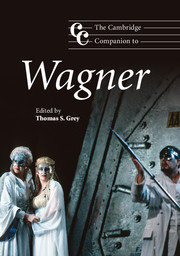Book contents
- Frontmatter
- PART I Biographical and historical contexts
- PART II Opera, music, drama
- 4 The “Romantic operas” and the turn to myth
- 5 Der Ring des Nibelungen: conception and interpretation
- 6 Leitmotif, temporality, and musical design in the Ring
- 7 Tristan und Isolde: essence and appearance
- 8 Performing Germany in Wagner's Die Meistersinger von Nürnberg
- 9 Parsifal: redemption and Kunstreligion
- PART III Ideas and ideology in the Gesamtkunstwerk
- PART IV After Wagner: influence and interpretation
- Notes
- Select bibliography
- Index
8 - Performing Germany in Wagner's Die Meistersinger von Nürnberg
from PART II - Opera, music, drama
Published online by Cambridge University Press: 28 September 2011
- Frontmatter
- PART I Biographical and historical contexts
- PART II Opera, music, drama
- 4 The “Romantic operas” and the turn to myth
- 5 Der Ring des Nibelungen: conception and interpretation
- 6 Leitmotif, temporality, and musical design in the Ring
- 7 Tristan und Isolde: essence and appearance
- 8 Performing Germany in Wagner's Die Meistersinger von Nürnberg
- 9 Parsifal: redemption and Kunstreligion
- PART III Ideas and ideology in the Gesamtkunstwerk
- PART IV After Wagner: influence and interpretation
- Notes
- Select bibliography
- Index
Summary
There is a long tradition of identifying Wagner's Die Meistersinger von Nürnberg with Germany and Germany with Die Meistersinger, regarding the work as more than just an opera (or even music drama), but rather the very emblem of a nation. The connection of nation and art is intertwined throughout the history of Die Meistersinger. Three very different examples can serve to illustrate the point. In Beyond Good and Evil, Friedrich Nietzsche described the Act 1 Prelude as “a truly genuine token of the German soul … This kind of music expresses best what I think of the Germans: they belong to the day before yesterday and the day after tomorrow – as yet they have no today.” A popular turn-of-the-century operatic guide called Die Meistersinger “the most beautiful, the most German of all operas.” And Nazi propaganda minister, Joseph Goebbels, in a radio address before a 1933 broadcast of the opening Bayreuth festival production of Meistersinger commented that: “Of all [Wagner's] music dramas Die Meistersinger stands out as the most German. It is simply the incarnation of our national identity.” The perennial “German question” (“what is Germany?”) underlies this work, as it does most of Wagner's works, not simply by virtue of the proximity of German unification (1871) to its premiere (1868), but also through the resonance of this event in Wagner's contemporary writings, in the genesis of the work, and especially in its reception.
- Type
- Chapter
- Information
- The Cambridge Companion to Wagner , pp. 134 - 150Publisher: Cambridge University PressPrint publication year: 2008
- 1
- Cited by



